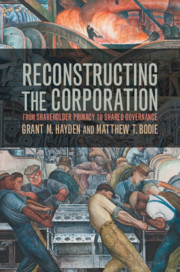Book contents
- Reconstructing the Corporation
- Reconstructing the Corporation
- Copyright page
- Dedication
- Contents
- Preface
- Acknowledgments
- 1 Introduction
- 2 Preference Aggregation in Political Institutions
- 3 Preference Aggregation in Corporations
- 4 The Corporation as Contract
- 5 Shareholder Homogeneity
- 6 The Argument from the Residual
- 7 The Argument from Arrow’s Theorem
- 8 The Shareholder Franchise and Board Primacy
- 9 A Firm-Based Approach to Corporate Voting Rights
- 10 Democratic Participation and Shared Governance
- 11 The German Codetermination Experience
- 12 Conclusion
- Notes
- Index
11 - The German Codetermination Experience
Published online by Cambridge University Press: 18 February 2021
- Reconstructing the Corporation
- Reconstructing the Corporation
- Copyright page
- Dedication
- Contents
- Preface
- Acknowledgments
- 1 Introduction
- 2 Preference Aggregation in Political Institutions
- 3 Preference Aggregation in Corporations
- 4 The Corporation as Contract
- 5 Shareholder Homogeneity
- 6 The Argument from the Residual
- 7 The Argument from Arrow’s Theorem
- 8 The Shareholder Franchise and Board Primacy
- 9 A Firm-Based Approach to Corporate Voting Rights
- 10 Democratic Participation and Shared Governance
- 11 The German Codetermination Experience
- 12 Conclusion
- Notes
- Index
Summary
This chapter discusses the German experience with supervisory codetermination, in which shareholder and employee representatives share governance of large corporations. After discussing the basic features of the system, we examine how it has been viewed by American corporate law scholars as an anomaly that could only arise through legislative fiat. In fact, the German system was born of consensual agreement at a time when labor and capital had roughly equal bargaining power, and only later became enshrined in law. We then discuss recent studies that evaluate how well codetermination serves the needs of various corporate constituents, including employees, creditors, and shareholders, and the role it played in Germany's relatively rapid recovery from the global financial crisis. In the end, the success of the German system serves as an empirical rejoinder to the hypothetical arguments used by law and economics scholars to justify the exclusive shareholder franchise, as well as a sort of proof of concept of the shared governance model.
Keywords
- Type
- Chapter
- Information
- Reconstructing the CorporationFrom Shareholder Primacy to Shared Governance, pp. 172 - 183Publisher: Cambridge University PressPrint publication year: 2021

